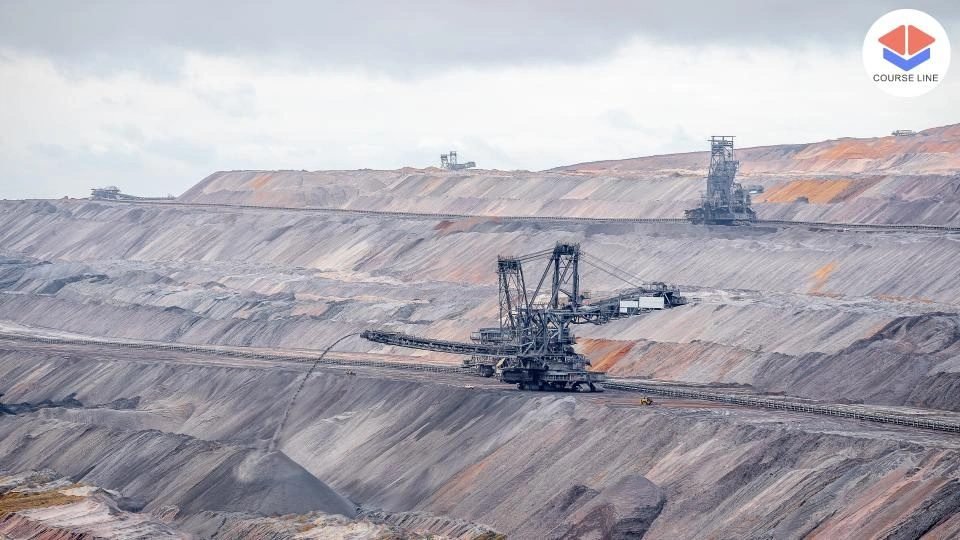Course Features
Price
Study Method
Online | Self-paced
Course Format
Reading Material - PDF, article
Duration
5 hours, 5 minutes
Qualification
No formal qualification
Certificate
At completion
Additional info
Coming soon
- Share
Overview
The "Mineral Economics and Project Evaluation Level 3 Advanced Diploma" offers an in-depth understanding of the economics behind mineral resource extraction and development. The course begins with an overview of mineral economics, including the significance of mineral resources and their impact on global economies. It delves into the methods used to assess mineral resources, such as geological and geophysical exploration techniques, and how to estimate the value of these resources effectively.
The program further explores economic evaluation techniques, including discounted cash flow (DCF) analysis, net present value (NPV), and internal rate of return (IRR), essential for determining the profitability of mining projects. Students will also gain insight into sensitivity analysis and risk management, allowing them to assess the financial stability of mining ventures under varying market conditions. With this knowledge, they will be equipped to evaluate the economic feasibility of mineral projects, making informed decisions about investment in the mining sector.
In addition to financial assessments, the course emphasizes the importance of environmental and social considerations, such as environmental impact assessments (EIA) and ensuring a social license to operate. These modules stress the need for sustainable development practices in the mineral industry, which are increasingly important in today’s regulatory and public perception-driven landscape. Real-world case studies, practical applications of economic evaluation techniques, and emerging trends in mineral economics ensure students are well-prepared for the challenges they will face in the industry.
Who is this course for?
The "Mineral Economics and Project Evaluation Level 3 Advanced Diploma" offers an in-depth understanding of the economics behind mineral resource extraction and development. The course begins with an overview of mineral economics, including the significance of mineral resources and their impact on global economies. It delves into the methods used to assess mineral resources, such as geological and geophysical exploration techniques, and how to estimate the value of these resources effectively.
The program further explores economic evaluation techniques, including discounted cash flow (DCF) analysis, net present value (NPV), and internal rate of return (IRR), essential for determining the profitability of mining projects. Students will also gain insight into sensitivity analysis and risk management, allowing them to assess the financial stability of mining ventures under varying market conditions. With this knowledge, they will be equipped to evaluate the economic feasibility of mineral projects, making informed decisions about investment in the mining sector.
In addition to financial assessments, the course emphasizes the importance of environmental and social considerations, such as environmental impact assessments (EIA) and ensuring a social license to operate. These modules stress the need for sustainable development practices in the mineral industry, which are increasingly important in today’s regulatory and public perception-driven landscape. Real-world case studies, practical applications of economic evaluation techniques, and emerging trends in mineral economics ensure students are well-prepared for the challenges they will face in the industry.
Requirements
The "Mineral Economics and Project Evaluation Level 3 Advanced Diploma" offers an in-depth understanding of the economics behind mineral resource extraction and development. The course begins with an overview of mineral economics, including the significance of mineral resources and their impact on global economies. It delves into the methods used to assess mineral resources, such as geological and geophysical exploration techniques, and how to estimate the value of these resources effectively.
The program further explores economic evaluation techniques, including discounted cash flow (DCF) analysis, net present value (NPV), and internal rate of return (IRR), essential for determining the profitability of mining projects. Students will also gain insight into sensitivity analysis and risk management, allowing them to assess the financial stability of mining ventures under varying market conditions. With this knowledge, they will be equipped to evaluate the economic feasibility of mineral projects, making informed decisions about investment in the mining sector.
In addition to financial assessments, the course emphasizes the importance of environmental and social considerations, such as environmental impact assessments (EIA) and ensuring a social license to operate. These modules stress the need for sustainable development practices in the mineral industry, which are increasingly important in today’s regulatory and public perception-driven landscape. Real-world case studies, practical applications of economic evaluation techniques, and emerging trends in mineral economics ensure students are well-prepared for the challenges they will face in the industry.
Career path
The "Mineral Economics and Project Evaluation Level 3 Advanced Diploma" offers an in-depth understanding of the economics behind mineral resource extraction and development. The course begins with an overview of mineral economics, including the significance of mineral resources and their impact on global economies. It delves into the methods used to assess mineral resources, such as geological and geophysical exploration techniques, and how to estimate the value of these resources effectively.
The program further explores economic evaluation techniques, including discounted cash flow (DCF) analysis, net present value (NPV), and internal rate of return (IRR), essential for determining the profitability of mining projects. Students will also gain insight into sensitivity analysis and risk management, allowing them to assess the financial stability of mining ventures under varying market conditions. With this knowledge, they will be equipped to evaluate the economic feasibility of mineral projects, making informed decisions about investment in the mining sector.
In addition to financial assessments, the course emphasizes the importance of environmental and social considerations, such as environmental impact assessments (EIA) and ensuring a social license to operate. These modules stress the need for sustainable development practices in the mineral industry, which are increasingly important in today’s regulatory and public perception-driven landscape. Real-world case studies, practical applications of economic evaluation techniques, and emerging trends in mineral economics ensure students are well-prepared for the challenges they will face in the industry.
-
- Overview of Mineral Economics 00:10:00
- Basic Concepts in Mineral Economics 00:10:00
- Economic Significance of Mineral Resources 00:10:00
-
- Methods of Mineral Resource Assessment 00:10:00
- Geological and Geophysical Exploration Techniques 00:10:00
- Estimation of Mineral Resources 00:10:00
- Discounted Cash Flow (DCF) Analysis 00:10:00
- Net Present Value (NPV) and Internal Rate of Return (IRR) 00:10:00
- Sensitivity Analysis and Risk Management 00:10:00
- Environmental Impact Assessment (EIA) 00:10:00
- Social License to Operate 00:10:00
- Sustainable Development in Mineral Projects 00:10:00
- Technological Innovations in Mineral Economics 00:10:00
- Market Trends and Forecasting 00:10:00
- Future Challenges and Opportunities in Mineral Resource Development 00:10:00
- Exam of Mineral Economics and Project Evaluation Level 3 Advanced Diploma 00:50:00

No Reviews found for this course.
Is this certificate recognized?
Yes, our premium certificate and transcript are widely recognized and accepted by embassies worldwide, particularly by the UK embassy. This adds credibility to your qualification and enhances its value for professional and academic purposes.
I am a beginner. Is this course suitable for me?
Yes, this course is designed for learners of all levels, including beginners. The content is structured to provide step-by-step guidance, ensuring that even those with no prior experience can follow along and gain valuable knowledge.
I am a professional. Is this course suitable for me?
Yes, professionals will also benefit from this course. It covers advanced concepts, practical applications, and industry insights that can help enhance existing skills and knowledge. Whether you are looking to refine your expertise or expand your qualifications, this course provides valuable learning.
Does this course have an expiry date?
No, you have lifetime access to the course. Once enrolled, you can revisit the materials at any time as long as the course remains available. Additionally, we regularly update our content to ensure it stays relevant and up to date.
How do I claim my free certificate?
I trust you’re in good health. Your free certificate can be located in the Achievement section. The option to purchase a CPD certificate is available but entirely optional, and you may choose to skip it. Please be aware that it’s crucial to click the “Complete” button to ensure the certificate is generated, as this process is entirely automated.
Does this course have assessments and assignments?
Yes, the course includes both assessments and assignments. Your final marks will be determined by a combination of 20% from assignments and 80% from assessments. These evaluations are designed to test your understanding and ensure you have grasped the key concepts effectively.
Is this course accredited?
We are a recognized course provider with CPD, UKRLP, and AOHT membership. The logos of these accreditation bodies will be featured on your premium certificate and transcript, ensuring credibility and professional recognition.
Will I receive a certificate upon completion?
Yes, you will receive a free digital certificate automatically once you complete the course. If you would like a premium CPD-accredited certificate, either in digital or physical format, you can upgrade for a small fee.
Course Features
Price
Study Method
Online | Self-paced
Course Format
Reading Material - PDF, article
Duration
5 hours, 5 minutes
Qualification
No formal qualification
Certificate
At completion
Additional info
Coming soon
- Share
Chemical Engineering Level 5 Advanced Diploma
Course Line237£490.00Original price was: £490.00.£14.99Current price is: £14.99.Environmental Acoustics Level 3 Advanced Diploma
Course Line238£490.00Original price was: £490.00.£14.99Current price is: £14.99.Electronics Level 3 Advanced Diploma
Course Line243£490.00Original price was: £490.00.£14.99Current price is: £14.99.





